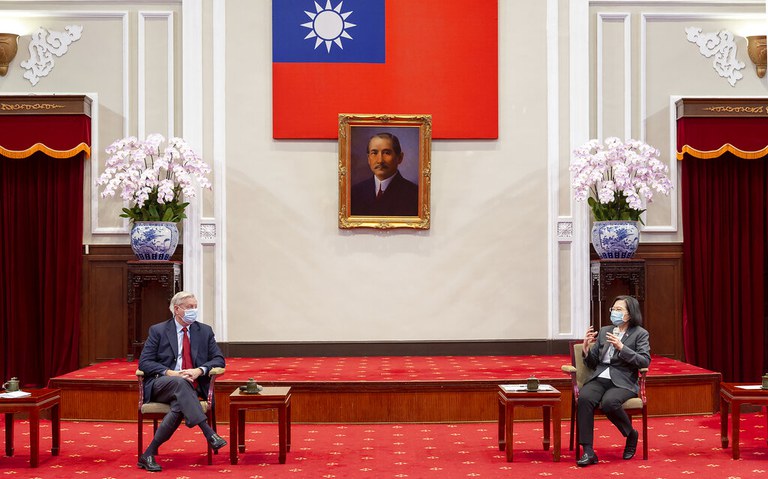White House: Biden to host US-ASEAN summit in Washington May 12-13
President Joe Biden will meet with Southeast Asian leaders in Washington for a special U.S.-ASEAN summit next month, the White House announced Saturday. The meeting in mid-May will take place amid tensions in the South China Sea, divisions among members of the Association of Southeast Asian Nations over its response to the crisis in post-coup Myanmar, and the lack of a collective condemnation by the bloc of Russia’s invasion of Ukraine – a stark contrast to the West’s condemnation of it. “President Biden will host the Leaders of the Association of Southeast Asian Nations (ASEAN) in Washington, DC on May 12 and 13 for a U.S.-ASEAN Special Summit,” White House Press Secretary Jen Psaki said in a statement. Cambodia, the 2022 holder of the ASEAN chairmanship, confirmed the new dates for the summit. “During this historic meeting, the Leaders of ASEAN and the United States will chart the future direction of ASEAN-U.S. relations and seek to further enhance strategic partnership for the mutual benefits of the peoples of ASEAN and the United States,” Phnom Penh said in a statement issued Sunday. The U.S.-ASEAN summit was originally scheduled for the end of March but was postponed because scheduling for the meeting ran into trouble when the facilitating country, Indonesia, could not get all ASEAN members to agree on a date. Next month’s meeting will be the second special summit between Washington and the Southeast Asian bloc since 2016 and the first in-person one since 2017, Cambodia said. “The Special Summit will demonstrate the United States’ enduring commitment to ASEAN, recognizing its central role in delivering sustainable solutions to the region’s most pressing challenges, and commemorate 45 years of U.S.-ASEAN relations,” Psaki said. The summit is also set to happen a few days after a general election in the Philippines to determine who will succeed Rodrigo Duterte as president of the longtime U.S. defense ally at the frontline of territorial disputes with Beijing over the South China Sea. During his nearly six years in office, however, Duterte has fostered closer relations with China despite diplomatic protests lodged by Manila over intrusions by Chinese coast guard ships and other vessels in waters within the Philippines’ exclusive economic zone. Balancing power The U.S. sees Southeast Asia as crucial to its efforts to push back against China’s rising power in the South China Sea and across the Indo-Pacific region. “It is a top priority for the Biden-Harris Administration to serve as a strong, reliable partner in Southeast Asia. Our shared aspirations for the region will continue to underpin our common commitment to advance an Indo-Pacific that is free and open, secure, connected, and resilient,” Psaki said. The Biden administration announced the new dates for the summit more than two weeks after the American president met with Singapore Prime Minister Lee Hsien Loong at the White House, where they discussed the South China Sea, among other issues. “From our point of view, freedom of navigation is important, international law is important, the U.N. Convention on the Law of the Sea [UNCLOS] is also important, and peaceful resolution of disputes so you avoid some accidental conflicts,” Lee said during an event at the Council on Foreign Relations in Washington on March 30, a day after his meeting with Biden. Myanmar crisis ASEAN, meanwhile, has been grappling with a 14-month-old crisis in bloc member Myanmar, where the Burmese junta’s forces have bombed and burned swathes of the country to quell resistance to the military’s overthrow of an elected government in February 2021. In late March, the junta blocked ASEAN envoy Prak Sokhonn from meeting with deposed leader Aung San Suu Kyi during his three-day visit to Myanmar, despite its pledge to grant him access to all political stakeholders, Prak, the Cambodian foreign minister, told reporters upon returning to Phnom Penh. At the end of an emergency meeting of ASEAN leaders in April last year, Senior Gen. Min Aung Hlaing, the junta chief who led the coup, agreed to allow an envoy from the Southeast Asian bloc access to all stakeholders in Myanmar as part of a Five-Point Consensus to end the political crisis in his country. Apart from the Myanmar crisis, the Russian invasion of Ukraine has tested ASEAN unity. In early March, the bloc as a whole issued a statement calling for a ceasefire but without naming Russia or using the word “invasion.” Meanwhile on March 2, most ASEAN member-states – except for Vietnam and Laos, which abstained – supported a much tougher U.N. General Assembly resolution against Moscow.



